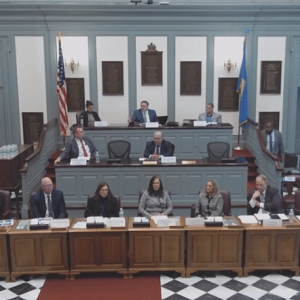
Wilmington City Council passed the city’s $201.7 million operating budget for Fiscal Year 2026. (Photo by pressfoto on Freepik)
Wilmington City Council passed the city’s $201.7 million operating budget for Fiscal Year 2026 on Thursday, approving investments in public safety, infrastructure, housing, and education, while avoiding an increase in property taxes.
The adopted budget reflects a $7.6 million increase over the previous year and includes a $95.1 million water and sewer fund operating budget. Utility rates will rise, with a 5.5% increase in water and sewer rates and a 6% increase in stormwater rates. These adjustments, reduced from an originally proposed 6.5% increase, are aimed at supporting Wilmington’s aging infrastructure. For a typical household using 4,000 gallons of water per month, the water rate hike equates to about $3.98 more per month.
RELATED STORY: Wilmington wraps FY 2026 budget hearings, final vote due by June 1
“Tonight, we have taken a significant step forward in achieving our collective goals,” said Finance & Economic Development Committee Chair and 4th District Council Member Michelle Harlee.
“This budget demonstrates our commitment to the needs and priorities of our City. I want to express my sincere gratitude for everyone’s hard work and collaboration in bringing this to fruition. With this budget, we can continue investing in initiatives that will create a meaningful impact. It stands as a testament to our shared vision for a better future. I am excited to witness the positive changes this budget will bring to our community,” said Harlee.
Council’s priorities include funding for public safety, housing repairs, beautification projects, minority-owned businesses, and education. Notable appropriations include $2 million for home repairs and alleyway assistance, $2 million in affordable housing capital funding, $3 million for parks, and $200,000 in scholarships for Wilmington students attending HBCUs. The budget also includes $350,000 for utility assistance and $30,000 for the Police Accountability Board.
Councilmembers emphasized collaboration with Mayor John Carney’s administration in crafting the final budget, particularly noting the inclusion of legislative priorities and responsiveness to councilmember feedback.
“Mayor Carney and his team have been very amenable and inclusive with this budget process, and I commend Mayor Carney and his team,” said Harlee during the meeting.
Council Member Chris Johnson praised the administration for including council priorities, saying, “We’re never going to get a perfect budget, but this one enhances our neighborhoods, enhances senior home repair program, enhances our parks. Every single investment is towards the city of Wilmington.”
RELATED STORY: Mayor Carney outlines his $200 M budget at latest Town Hall meeting
Concerns raised over Council spending and utility burdens
While the budget passed with broad support, several council members expressed unease about the growth of City Council’s own budget and the financial impact on residents.
“The council budget itself grew 20% or so again, which is, I think, embarrassing,” said At-Large Council Member James Spadola.
“Let’s solely focus on providing value to our residents and- put those dollars to more productive use elsewhere.” He noted this was a recurring trend and urged Council to reconsider adding new positions and consultant contracts.
Council Member Nathan Field shared similar concerns, pointing out that since 2023, Council’s budget has grown by approximately 72%.
“It does make it harder to challenge spending in other departments,” Field said. “And a year from now-when the mayor’s office determines that it needs to raise taxes-where will our credibility be challenging that?”
Despite these reservations, both Spadola and Field voted in favor of the overall budget, citing its broader benefits and strong investments in neighborhoods and infrastructure.
Council President Trippi Congo cast the lone vote against the budget, citing a different concern — the effect of rising utility rates on vulnerable residents.
“Our goal should always be to uplift our most vulnerable, and I believe this plan could have done more to ease their financial challenges,” Congo said.
The final vote on the operating budget was 11-1, with one council member absent.
RELATED STORIES:

Claudia is a Philadelphia-based journalist and reporter passionate about storytelling that informs and engages the community. Claudia, a proud Temple University graduate, has built a career covering impactful stories and creating compelling content across digital and print media platforms. With a strong background in writing, editing, and research, Claudia has worked on various topics, from local news to in-depth features, always striving to deliver meaningful and accurate reporting.
Share this Post












